How My Experiences with ADHD in Different Workplaces Led to a PhD and Training Programmes for Businesses and Schools

Written by Steve Ollington
ADHDer studying the pros and cons of ADHD in the workplace, with 19 years in digital marketing, and more recently running ADHD training.
I’m Steve Ollington, and I’m currently undertaking a PhD at Swansea University, supervised by Professor Brian Garrod, focusing on ADHD in the workplace. My research journey started with a personal observation: despite having a consistent skill set and high level of experience in my profession, I noticed that my performance varied significantly depending on the workplace environment. In some settings, I thrived; in others, I struggled to achieve the same level of productivity and job satisfaction. This discrepancy led me to examine how different workplace environments interact with ADHD traits, not just in terms of challenges, but also in enabling the often-overlooked strengths associated with ADHD.
Observing the Role of Environment in My ADHD Performance
In some roles, I was given autonomy and flexibility, which allowed me to excel. I had the freedom to approach tasks creatively, was trusted by managers, and felt supported by colleagues who understood different thinking styles. In these settings, I could harness the strengths that come with ADHD, for example innovative thinking and alternative (but effective) problem-solving. My performance was high, and I felt truly engaged in my work.
In other workplaces, however, I encountered rigid structures and strictly enforced processes with little flexibility. There was often limited understanding of alternative approaches to work, and I felt pressured to conform to methods that didn’t align with how I function best. This rigid structure amplified the challenges of ADHD, while stifling my ability to bring my strengths to the forefront. In these environments, I found myself struggling as a result.
Recognising the Potential of ADHD Strengths in the Workplace
Through these contrasting experiences, I realised that while my ADHD challenges remained constant, my ability to utilise my strengths was significantly influenced by the environment, including the acceptance of my differences by those around me. Some workplaces allowed me to maximise my capabilities, while others hindered them. This insight led me to pursue a PhD, focusing on ADHD in professional environments. Rather than just examining the difficulties faced by ADHD employees, I wanted to highlight the strengths and explore the specific workplace conditions that either foster or inhibit these strengths.
Research supports the notion that ADHD brings unique strengths. Dr Heiner Lachenmeier’s book ADHD and Success at Work, for instance, describes how people with ADHD often have a “wider breadth of association” due to a reduced filtering of incoming information, which enhances creativity and problem-solving abilities.
Research by Dr Nancy Doyle on neurodivergence in the workplace, combined with studies on creativity and imagination by White and Shah demonstrate that ADHD individuals can excel in environments that embrace cognitive diversity. Creativity, for instance, is often heightened in ADHD individuals due to the way they process information, thinking beyond traditional boundaries. However, these strengths can only be fully realised in workplaces that are flexible, supportive, and open to alternative working styles.
Dr Edward Hallowell also discusses this in his book Driven to Distraction at Work, noting that ADHD can fuel high energy, hyperfocus, and enthusiasm when supported in the right way. Additionally, Prof Amanda Kirby and Theo Smith, in The Power of Neurodiversity at Work, as well as Leanne Maskell in ADHD Works at Work, advocate for environments that understand and embrace neurodiversity, highlighting the benefits employees with ADHD can bring to the workplace.
Developing Targeted ADHD Training Courses
This studying inevitably led to increasing my own understanding of ADHD and its impact on my work, and the more I learned, the more it became evident that many workplaces lack the necessary understanding and support for neurodivergent employees. Despite increased emphasis on diversity and inclusion, neurodivergence (including ADHD) is still very often misunderstood, with much of the current training being very broad and general, not focusing enough on individual conditions. I saw, and experienced, the need for specific training to address not only the challenges but also the strengths associated with ADHD, and the resulting understanding from workplace peers who might have neurotypical only expectations of skills like communication and approaches to tasks.
This realisation led me to transform my PhD literature review into two targeted training courses. The first course is designed for businesses, specifically aimed at training managers, HR, and colleagues of people with ADHD, focuses on understanding ADHD from a balanced perspective, covering how ADHD employees think differently, the areas in which they may need support, and how workplaces can harness their unique strengths. It encourages flexibility, trust, and space for creativity, which are key to enabling ADHD employees to thrive.
The second course is geared towards educators, providing ADHD training for teachers, TAs, and SEN staff, to equip them with the knowledge to reassure ADHD children and teenagers on how ADHD doesn’t have to limit them as they grow up, and that in fact they their ADHD also brings strengths, such as creative thinking and resilience. By emphasising these positive traits, educators can help ADHD students see their future as one filled with potential and opportunity.
The one human skill that powers all others: Is empathy the secret to wellbeing, inclusion & the future of work?

Written by Ed Kirwan
Ed Kirwan is the Founder and CEO of Empathy Studios, an organisation using film to develop empathy, a vital human skill. A former science teacher and Head of Chemistry, Ed transitioned into filmmaking in 2018, launching The Empathy Programme in 2020. Ed also founded Empathy Week, the world’s largest empathy festival, reaching over 1.3 million students in 50 countries.
As an educator, you’re often faced with student situations you can’t anticipate. Those situations are almost always personal, nuanced and highly-specific to that individual. They require a human response. They require empathy.
Empathy is the skill to understand another and the ability to create space for someone to reveal their authentic self, whilst reserving judgement.
Empathy is no longer merely a nice-to-have; it’s essential and has been listed as one of the most vital skills for the 21st century. Is vital for conflict resolution, it helps increase creativity) and can even reduce cyberbullying. Empathy can be passed from generation to generation View here and so teaching it has far-reaching benefits beyond the immediate impact.
Neighbourhood diversity has doubled on average in the UK since 2001 and, in some towns, it has increased ten fold. This should be a wonderful opportunity of celebration and learning, yet we know from the UK riots this summer that cohesion and community isn’t a given. It also doesn’t come about from simply teaching students to ‘be kind’ and ‘be tolerant’. Empathy sits at the foundation of the human skills that enable inclusion, communication and adaptability that are crucial in our globalised world.
Since 2020, my team and I have been helping educators give their students the tools needed to develop empathy – and we continuously research the impact, in partnership with Cambridge University . In these last five years we’ve learnt a lot. Our Empathy Programme has engaged 175,000 students and our annual festival, Empathy Week, has reached over 1.3 million students in 50+ countries. But for me, it all started in the classroom.
At the age of 22, I began teaching science in North London at a co-ed state school – something I deeply loved. It taught me a lot about privilege, society and the importance of empathy. It also taught me that humans are complex social and emotional beings.
Much of my motivation comes from having taught the infamous (self-named) “U-gang” – a group of 24 boys who all received ‘U’ grades in their christmas mock exams.
They had a lot of anger and lacked motivation. In their eyes, they were already destined to be a failure. They hadn’t yet learnt how to communicate their needs effectively, or they were misunderstood – in all honesty I think it was both things at once. As I got to know them I realised they were, quite simply, scared young men.
Teaching that group was one of the most rewarding experiences in my teaching career. None of the “U-gang” ended up with a U grade, despite one of my students missing his Chemistry exam because he was in a police cell. They all passed.
Looking back now it’s not because I was the best science teacher, but because I took a genuine interest in them as individuals. Who did they live with at home? What hobbies did they have? What did they aspire to be? What made them tick?
I took as many steps as possible to understand and develop a healthy rapport with the class, including delivering science classes on the basketball court and shifting our practical lessons to be less daunting. I was using empathy, I just didn’t have language for what I was doing yet.
Empathy underpins everything needed to make a child feel seen, heard and understood. Everything that’s needed to make someone feel safe and like they belong and that’s what we’re all really after isn’t it? To belong?
Empathy is not a value or a trait. It is a skill which can be actioned and, crucially, taught. Our pilot research with Cambridge University explores the impact of our term long programme to develop empathy skills in 5-18 year olds. Teachers report a measurable impact to empathy levels – and excitingly they also report improvements to behaviour and increased global citizenship after completing the programme.
Crucially there are three drivers of success that manage to build empathy successfully:
1) Engage and entertain students – A lot of education content can be boring and only serves to transfer information rather than ignite genuine conversation and learning. Our programme and films are a trojan horse for empathy building. They excite students from the very start and in turn lead to conversations and connection.
2) Increase the amount & diversity of experiences of students – We can’t all fly around the world, but we can allow students to experience real life stories through film. From Lipa who talks about the right to wear a Hijab in sport to a Mexican paralympian who is now giving back,, students can gain insight into themes such as culture & identity, disability, bereavement, sustainability & mental health.
3) Skills building can’t be a one-off – Empathy is a muscle and the best results come with sustained and long-term intervention. It’s the schools that build empathy into a golden thread of their school that are seeing the benefits.
As educators and teachers, we need more support to help equip young people with the human skills they need. As the world becomes ever more connected and AI transforms the way we live and work together, it is our human relationships, adaptability and resilience that will allow us to thrive – and empathy is the one human skill at the foundation of this.
Equal Pay Day
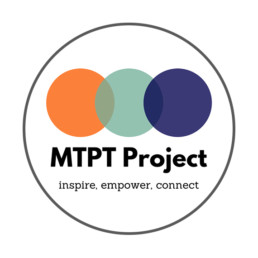
Written by The MTPT Project
The UK’s only charity for parent teachers, with a particular focus on the parental leave and return to work period.
This Autumn, we celebrate International Equal Pay Day (18th September) and the UK’s Gender Pay Gap Day (probably around the 22nd November).
“Celebrate” is probably the wrong term for it, with the United Nations telling us that “Across all regions, women are paid less than men, with the gender pay gap estimated at around 20 per cent globally.”
Out of 146 countries, the UK ranked 15th in a 2023 World Economic Forum comparison, up there with the best and trailing just behind Iceland, Namibia, New Zealand and Rwanda, amongst others.
Fifteenth out of 146 sounds great but… it’s not that great. The UK still has a gender pay gap across all industries of 14.3% meaning that women are paid (on average) 86p for every £1 that men are paid.
In the education sector, it’s even worse, with the gender pay gap standing at 18.1%. Some multi-academy trusts (we won’t name them) fare terribly, with gender pay gaps of up to 44.6%. Why not enjoy the government’s brilliant Search and Compare tool that lays the facts bare in a simple click to satiate your curiosity?
While the graphs in ASCL et al.’s updated 2023 report indicate that a slight gender pay gap exists at almost all levels (female classroom teachers actually slightly outearn male classroom teachers), a seismic shift happens between the ages of 30-39, particularly between 35-39 when – you guessed right – teachers are most likely to become mothers.
57% of female teachers aged 30-34 are mothers, jumping to 77% for women aged 35-39. During this time, the gender pay gap increases by between £846 (“other leadership”) to £2,131 (headteachers) per year. Classroom teachers – previously outearning their male counterparts by £143 per year – suddenly suffer a wage gap of £1,253.
The explanation: of course, it is the motherhood penalty in action. Studies largely agree that “women’s inability to combine work with family seems to account for the lion’s share of the pay gap” and in Missing Mothers – a report co-authored by The MTPT Project and The New Britain Project – we explain how this impact is being felt in teaching.
Motherhood means that we are losing experienced teachers in droves; they are paid less when they remain in the profession, and are underrepresented at leadership level.
Solving the gender pay gap in any industry is complicated. The same goes for what we like to term more precisely, the “fiscal motherhood penalty in education”. But the Missing Mothers report lays out one simple recommendation to government: shift the investment currently focused on recruitment, to retention.
Specifically, focus on retaining and improving working conditions for women aged 30-39 by addressing and reducing the motherhood penalty.
Want to do more this autumn to reduce the impact of the motherhood penalty in education? Book in a 30 minute call with Emma at The MTPT Project between 18th September – 22nd November. She’ll share more about why the motherhood penalty exists and the right questions to ask, and strategies to implement to make a real difference in your organisation. The fun gimmick? She’ll charge you the rate of your organisation’s pay gap for the consultation session.
LGBTQ+ teachers don’t receive the training and support they need
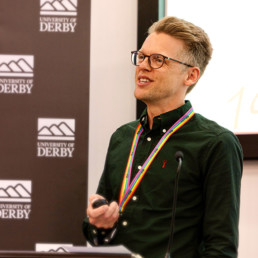
Written by Dr Adam Brett
Adam has completed a doctorate exploring the experiences of LGBT+ secondary teachers. A presentation of his findings can be found here. He also co-hosts a podcast called Pride and Progress, @PrideProgress, which amplifies the voices of LGBT+ educators, activists and allies.
Originally posted on The Conversation in May 2024:
https://theconversation.com/lgbtq-teachers-dont-receive-the-training-and-support-they-need-228162
Republished with permission of the author.
LGBTQ+ teachers report feeling stressed and even discriminated against in the workplace due to their identity. This is a problem when keeping teachers in their jobs is vital. Teaching is facing a crisis in both recruitment and retention: in 2021-22, more than 39,000 teachers quit the profession.
But there is no formal support or training offered to LGBTQ+ teachers by the Department for Education. Supporting the teaching workforce who identify as LGBTQ+ and making teaching a welcoming profession should be a priority for the government.
For LGBTQ+ teachers, working in UK schools may no longer be the deeply traumatic and dangerous experience it was under Section 28 of the 1988 Local Government Act, which was repealed in 2003. This law sought to ban local authorities and their schools from promoting the acceptability of homosexuality as a “pretended family relationship”.
But LGBTQ+ teaching staff continue to face challenges such as feeling unsafe in their workplace.
Throughout their careers, LGBTQ+ teachers are placed in the difficult position of deciding whether they should conceal or reveal their sexual or gender identity. This is not a decision they are trained to deal with, nor a decision they make just once. It is particularly tricky in schools where teachers must decide if, when, and how to be open with different groups – staff, students, parents, and others involved in school life.
As an LGBTQ+ former teacher, I know first-hand the emotional tax that comes with continuously negotiating LGBT+ visibility and identity within school.
Unsafe spaces
For my doctoral research I worked with 12 LGBTQ+ teachers from a variety of contexts, including faith, private, and single sex schools. The teachers took photos to represent the spaces where they felt most and least safe within their school, and described the significance of their photos.
The teachers changed how they behaved out of fear of being seen as LGBTQ+. They did this in particular in open or visible spaces, such as when on break duty, leading an assembly or in the staffroom.
In these spaces, the LGBTQ+ teachers were fearful of comments or incidents related to their identity that they felt unequipped to deal with. One teacher said:
I give my assemblies quite often, and I don’t hide my sexuality from anybody, so the student body knows that I’m gay … but when I’m doing my assemblies I feel, I feel scared and I don’t know if it’s because I know that they know that I’m gay and therefore, I’m like afraid of them … I don’t know hurling a slur or something.
By contrast, the teachers often described their classrooms as the spaces where they felt most safe. Here, they had created their own routines, relationships and systems.
Among the 12 participants, there were teachers who had been told not to discuss their sexual or gender identity. One teacher told me that they and others had been asked to sign a non-disclosure agreement in a Catholic school: “We weren’t allowed to talk about the fact [that we were gay],” they said.
These are extreme examples. Generally, though, the assumption of heterosexuality in schools can lead to personal questions and situations that LGBTQ+ teachers often feel unequipped to deal with.
Cisgender and heterosexual teachers might be asked about their partners and families and would feel no fear of retribution or backlash in answering those questions. But what might be an entirely unremarkable conversation for a heterosexual teacher might well be deeply fraught for an LGBTQ+ teacher. This can be understood as “heterosexual privilege”.
Despite thousands of the teacher workforce identifying as LGB+, they receive no formal support or training for the challenges that they are likely to experience in their career. Sending LGBTQ+ teachers into schools without adequate support or training will probably lead to these teachers experiencing discrimination and stress.
Some teacher training providers ensure that trainees from minority backgrounds receive training and support to help them face the additional barriers they may experience in schools. However, implementation remains inconsistent.
Future reforms to the Initial Teacher Training and Early Career Framework, which outlines the minimum entitlement for trainee and early career teachers, must reflect these challenges to ensure a minimum and equitable level of provision for LGBTQ+ teachers. If they don’t, fewer LGBTQ+ teachers will enter or remain in the profession. Students and families won’t see themselves represented, and young people won’t be equipped for life in a diverse society.
LGBTQ+ people have the potential to make exceptional teachers and leaders. With the right support, they can thrive in the profession and provide young people with the role models that they desperately need.
#AllTheThings
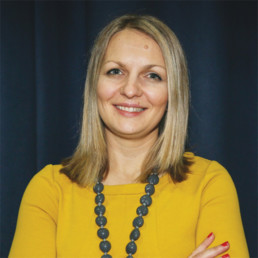
Written by Helena Marsh
Helena is a WomenEd co-founder, mum of three and experienced school and Trust leader. In her ninth year of secondary headship, Helena has also held the role of MAT CEO. An advocate of flexible working, Helena co-wrote the ‘Flexing our Schools’ chapter in the first WomenEd book and has been an active supporter of the Flexible Working Ambassador Scheme and the MTPT Project.
Spending the day among some incredible inspiring women at the ‘Breaking the Mould’ event on 9th March at Milton Road Primary School, Cambridge, was a fabulous way to mark this year’s International Women’s Day.
Hannah asked me to contribute to the event when we met for an after work mocktail in May 2023. At the time, having this little spot of feminist joy to look forward to on the horizon really uplifted me at a particularly bleak moment in my leadership career.
Several months later, I was not disappointed. Featuring amongst a programme of kick-ass women gave me a real sense of personal and professional rejuvenation.
My session, entitled ‘What’s the point of cake if you can’t eat it?’, focused on my experiences, as a mum of three, of gendered perceptions of leadership. In my 15 years as a senior leader, I’ve been conscious of women stepping away from the profession, and their leadership potential, citing selfishness and a pragmatic need to focus on their families, as the reason.
To coin a phrase by Summer Turner, I questioned: ‘Are the boys also worrying about this?’ Do men perceive becoming a dad and maintaining their career as ‘having it all’?
Gender pay gap research reveals that they don’t. The Fatherhood Bonus, in stark contrast to the Motherhood Penalty, rewards men for becoming fathers. While women are stepping down or away to focus on caregiving and accepting the inevitability of this pause/permanent freeze in their professional journey, men are, statistically, enjoying promotion and pay progression when starting a family.
My presentation focused on the factors, institutional, societal and personal, that lead to women feeling as though progressing professionally is not a viable choice once becoming a mum. I concluded that wholesale changes to sector expectations of leaders is necessary. As Jill Berry wisely observes, if having a job and a life isn’t achievable, there’s a problem with the job.
The other inputs to the day complemented this theme. Particularly Niamh Sweeney’s rousing cry to tackle the injustices within the profession that inhibit and preclude. Niamh’s anecdote from her recent trip to the States chimed with many of us in the audience. The audacious goal of winning ‘all the things’ spoke to a refreshing cultural ambition. Meanwhile, many of the other talks highlighted the importance of acknowledging feminine leadership traits and valuing the benefits of diversity in leadership teams.
I left the day reflecting on how often ‘having it all’ is misunderstood for ‘doing it all’. My Mother’s Day stash of gifts that I received the following day from my little ones included various iterations of listing pads. As a fan of organisational stationery, I was chuffed with my haul. However, it did make me recognise how much of my sense of success as a mum and leader is measured through my accomplishment of ‘stuff’. Many women that I have worked with pride themselves on getting all the sh*t done and to an exceptional standard, often at the expense of their personal health and wellbeing.
As I acknowledged in my IWD talk, the weight of the mental load that mums carry, let alone mum leaders carry, is immense. It’s important that having #AllTheThings doesn’t necessitate us doing everything but having our fair share of whatever it is we strive for, whether that’s cake, career development opportunities or childcare responsibilities.
Should schools provide prayer spaces?

Written by Zahara Chowdhury
Zahara is founder and editor of the blog and podcast, School Should Be, a platform that explores a range of topics helping students, teachers and parents on how to ‘adult well’, together. She is a DEI lead across 2 secondary schools and advises schools on how to create positive and progressive cultures for staff and students. Zahara is a previous Head of English, Associate Senior Leader and Education and Wellbeing Consultant.
The recent High Court decision, ruling in favour of headteacher Birbalsingh’s decision to ban prayer spaces has created quite the media storm. The decision has raised concerns about the precedent it sets for schools creating safe spaces for students and staff, Muslim students and staff in particular. It has also raised conversations about what schools are for and how schools and workplaces can fulfill their obligation to adhere to the Equality Act and The Public Sector Equality Duty – and how they can get around it too.
The responses to the verdict reveal that we live in a society and online world in which Islamophobia and anti-Muslim hate is increasing; whilst we have ‘come a long way’ in overcoming Islamophobia since 9/11, a high court ruling like this makes me wonder if we’ve made any difference at all to the safety of Muslims for future generations? The verdict also reveals the disconnect that exists within the school system itself: we have some leaders who are not interested in creating unity and understanding within a diverse country – yet at the same time they ‘tokenistically’ take pride in multiculturalism too. And, we have other leaders in education giving us hope, embedding inclusive and equitable practices in everyday school life. I find it baffling that a simple question about prayer spaces ends up at the gates of a High Court. To me, this not only reveals a lack of unity and understanding in a school but also an absence of a critical skill that should be at the centre of schooling: listening.
Many educators and commentators have been sharing their concerns and outrage about the decision. It will also concern parents and students who regularly use prayer spaces in schools, maybe even at work (many teachers use prayer spaces too). It’s a disappointing decision and whilst several anti-woke keyboard warriors rejoice at the ruling, we cannot let it set a precedent for schools – and I don’t think it will. Schools absolutely should provide prayer spaces and they will continue to provide such safe spaces for students – it’s quite simply common sense. For this blog, examples and explanations are practical and experiential, based on what life is like ‘in school’. Whilst research and data are important, progress, collaboration and community cohesion are also nurtured by listening to the candid, lived experiences of staff and students in schools.
Time and space to pray
In line with the Equality Act, allowing students and staff to pray is reasonable and proportionate to a school and working day. It is comparable to allowing students to have break times, music lessons and god-forbid, toilet breaks. Different forms of prayer and spiritual practice are a part of nearly every faith. In Islam, praying 5 times a day is an integral part of the faith. It takes 5-10 minutes to pray. For the duration of that time, a prayer mat takes up just as much space as a two-seater desk. Depending on the time of year, prayer usually fits into a lunchtime. Just as schools host extracurricular clubs, music lessons sports fixtures and more, prayer can usually fit into this time too. It is not a big ask and it is not disruptive.
Some schools may have a designated prayer room, which is great. Other schools may allocate a classroom, usually near a space where a teacher is ‘on duty’ anyway; the last time I checked, prayer doesn’t require back flips, cartwheels or balancing on one’s head…the health and safety risks are fairly manageable. Some schools might even say, ‘if you need to pray and you have what you need with you (prayer mat, head covering, beads, holy book etc…), feel free to use a designated safe space. It does not need to be complicated.
Prayer spaces are not the problem
To blame prayer and collective worship for peer pressure and bullying is deflecting from the real problem. If children start praying as a result of seeing others pray, or if they simply observe with questions and curiosity, why is this such a problem? If they find it to be a positive experience, surely that can only be a positive learning experience. If the opposite happens, it’s not necessarily a problem either. Rather, it’s a teachable moment and reveals hostile attitudes any school should be aware of. Knowledge about the prejudices within our communities is the first step to safeguarding young people in education. ‘Cancelling’ or banning prayer spaces is not.
‘Banning’ or ‘cancelling’ (on and offline) doesn’t work. It is a power-based behaviour management tool fuelling a notion that education is based on ‘controlling the masses’. We all learn through conversation, discussion, listening, knowledge, understanding, boundaries and respect, not necessarily in that order. By no means are any of the latter ‘easy’ to achieve, but from working with teenagers I’ve found they’re open to a heated debate, discussion, learning, understanding and compromise.
School is a place of work and I’m not sure why we expect teenagers to just abide by ‘yes and no’ rules with little to no explanation. Plus, if they find a reasonable solution (like praying in a classroom for 10 minutes at lunchtime), what’s the big deal? Secondary school students are a few years away from further education and the workplace, which we all know thrives on innovation, creativity and autonomy. In this case, a blanket prayer ban in a school (their current place of work) completely contradicts the 21st century workplace they will inhabit. It doesn’t make sense.
‘It’s inconvenient: we don’t have time to police prayer spaces’
Like any theory of change, whether that be introducing a mobile phone policy or changes to a uniform policy, navigating any arising teething issues (by students, parents and the community), takes time and flexibility. None of this is impossible if it is built firmly into the school culture, relevant processes and policies. These policies and processes may be safeguarding, anti-bullying, behaviour management and curriculum. All of the above are part of a teacher’s and a school’s day-to-day functions; navigating prayer spaces is no different to introducing a new club or curriculum change. Plus, we somehow managed bubbles and one-way systems post-lockdown…I think schools are pretty well equipped to create a prayer space for all of a matter of minutes in a day!
Prayer is not ‘an add on’
Faith is observed differently, from person to person. It is a way of life, and an ongoing lived experience; for some it is an integral part of their identity and for others it is their identity. Prayer is a major part of several religious practices. Like some people are vegan and vegetarian, prayer is not just a choice and something to switch on and off – it is an intrinsic part of an individual’s life. Some individuals, as far as they possibly can, plan their days, weeks, holidays and more around prayer. Not only is it a religious obligation, it is also a source of wellbeing and peace. In a time where health and wellbeing are paramount in education, denying prayer spaces seems counterintuitive. Enabling some form of space (like we do options on a menu) for individuals to pray is a minimal request and something schools can do with minimal disruption. However, if cracks in the system are revealed and outrage spills online and at the High Court, there are bigger questions and concerns to address.
Schools don’t need to be ‘impossible’ or difficult spaces – and they shouldn’t be made out to be like this either. One high court ruling does not define the state of schooling in the UK. I have too much respect and experience (or maybe good fortune) of working in schools that enable, or at the very least, welcome conversations around inclusion, safety, flexibility and authenticity. None of the latter disrupts mainstream education and a student’s chances of attaining a grade 9. However, many other things do and those are inequitable opportunities, ‘belonging uncertainty’ (Cohen, 2022) and denying the identities of the young people we teach.
Why are we still denying part time and flexible working to those in leadership roles?
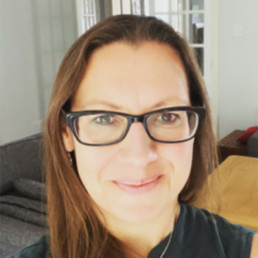
Written by Maz Foucher
Maz is Regional Representative for the MTPT Project in Devon and a former Assistant Headteacher and KS2 lead, based in Devon. Having juggled full time teaching, school leadership and parenting, she has a great understanding of the challenges faced by those with a young family. After moving on from school-based roles, Maz studied for an MA in Education Leadership specifically researching teacher retention, and now works in education publishing.
While researching teacher wellbeing and retention, I have often come across the suggestion that working part time or flexibly aids both the wellbeing and retention of staff. However, I have also found that this is still not an option available to many of those working at a leadership level, so let’s look at the facts.
24% of employees in the UK work part time and these are primarily women (ONS, 2022). This is echoed within the teaching profession, also at 24% (School Workforce Census, 2022). However, while the education profession is predominantly female, fewer women work part time in education (29% – School Workforce Census, 2022) compared to the overall UK labour market (36% – ONS, 2022). Additionally, when compared to different age ranges and genders, it is most likely that those working part time are women between the ages of 30 – 39 (ONS, 2022) This coincides with the age where many women start a family, and this is also the demographic most likely to leave teaching entirely (DfE, 2022).
If we look more closely at the 24% of teachers working part time, when this is broken down by role we can see that:
- 26% of class teachers work part time
- 11% of deputy heads work part time
- 6% of headteachers work part time.
(School Workforce Census, 2022).
It is clear from these statistics that, of the women in education who are working part time, the vast majority of these are not doing so at a senior leadership level. This could mean that they have decided for themselves that leadership is incompatible with part time working and parenthood. However, these statistics could also indicate that these women are not being encouraged, supported or allowed to work in senior leader roles part time. Indeed, despite ongoing headlines about the benefits of flexible and part time work, there are many schools and trusts who persist with a policy of no flex/part time at leadership level.
It could be said that it is preferable for leaders to work full time. The need for leaders to be present to deal with staffing, behaviour and safeguarding issues is a very real and relevant argument. From my own experience, I know that when headteachers and senior leaders are not present, it can lead to additional pressures on those within middle leadership roles. In a profession where 78% of school staff are experiencing stress (Teacher Wellbeing Index, 2023), it could be argued that exposing staff to additional pressures that they are not paid/contracted to handle is counterproductive.
Additionally, employers are within their rights to deny flexi and part-time working requests if they can prove that these will hinder business outcomes. In the case of education, I have heard arguments that part time leadership can impact on the smooth running of the school, its pupil outcomes, Ofsted ratings and pupil numbers, especially if parents consider leadership to be inconsistent and therefore chaotic.
However, there are also many positives to having leaders work flexibly or part time. And given that women, particularly those in the 30-39 bracket, are most likely to request this sort of contract, the all-too-common policy of no flex/part time options at a leadership level could also be seen to be seriously disadvantaging aspirational women in education, forcing them to choose between their family and their career. Is not uncommon to see female education leaders step back from these roles, leave teaching entirely or indeed find themselves demoted, when family commitments require them to reduce their hours at work.
The first question this raises is how valued these women feel within the workplace when their experience and expertise is suddenly overlooked once they become a mother and are no longer available for full time hours. I’ve heard this described as ‘Your skills are only valued if you’re there full time.’ I know many who suddenly feel like their level of competence or their commitment to their school is in question, made to feel like a burden on their workplace, that they are workshy or lazy if they can’t work in the same way that they could before motherhood. This additional pressure could be a catalyst for why these women often end up leaving education entirely. While there are many inspirational female teacher-parents who are forging the way forwards in leadership roles, it is clear from the data that very few mothers are finding that the workload, the pressure, their school’s policies and their own family set-up are allowing them to do this full time.
With all this in mind, if we also consider the persistently huge gender pay in education – the third worst across all sectors at 20.4% (BBC, 2023) – alongside the knowledge that women who are mothers are the demographic who are most likely to ask for part time work, we can begin to see how the policies which do not allow part time and flexi working at a leadership level are in fact indirectly discriminatory towards women. When we know that it is illegal to discriminate against the protected characteristics of sex and maternity/pregnancy (Equality Act, 2010), it begs the question as to how long it will be before cases of this nature end up in court?
Personally, I have often said that the teaching profession is full of intelligent and creative people who should be open and willing to rethink how we organise the workforce. Retention is always a better and cheaper option in the long run than recruiting and retraining new staff. In a teacher retention crisis, where we desperately need our experienced teachers to remain in the workforce to support and mentor the new teachers we require, we must celebrate and share examples of where flexible or part time working at a leadership level is proving to be a successful strategy for retention. There are many schools and trusts out there who are able to retain aspirational women at all levels of the profession when they become mothers by supporting them to work PT or flexibly. Imagine a world in which a mother returns to the profession with the conviction that they are still a very valued and an integral part of the workforce, even if they can only commit to part time work? Isn’t this better than losing them from the profession entirely?
Diversifying Coaching in Education – A Funded Opportunity for the #DiverseEd Community to Train to Coach

Written by Yasmin Ariff
Yasmin Ariff is a Partner and Director of Education at the CVP Group. CVP Group specialise in professional coaching training for managers and business leaders. They create coaching cultures across UK organisations, supported by the National Apprenticeship Service.
I wish I’d found coaching earlier in my teaching career. It has made me a better person on so many levels. But it came at a cost. Having invested £8000 of my own money into coaching training, it’s fair to say, although it’s been worth it, it also broke the bank balance.
It made we wonder whether coaching would ever be a truly diverse and inclusive profession when only those with a higher-than-average income could afford the training. Even hiring a coach can cost around £100 per hour.
So, how can we, as leaders, democratise coaching in Education?
How can we create a pool of coaches that represent the diverse backgrounds of our Educators?
If only there was a government-funded training programme for aspiring coaches that removed the barrier of cost…
If only there was a coaching training programme that promoted and included a range of diverse educators…
Look no further!
CVP Group and #DiverseEd are partnering to deliver a funded training programme in October 2024 for aspiring coaches in England.
To apply, you will need to complete this #DiverseEd EOI and they will then send you the CVP ROI with the #DiverseEd Referral Code.
Introducing the Level 5 Coaching Professional Apprenticeship
Our unique approach supporting aspiring and existing diverse leaders will support you to:
- engage with your workforce
- promote active listening skills
- deepen your understanding of what motivates teams
- improve staff retention
- support other aspiring or existing diverse leaders
The 12 month apprenticeship programme is delivered online including an End Point Assessment.
The Level 5 Coaching Professional Apprenticeship enables learners to work towards a nationally recognised qualification that meets coaching professional body standards (ICF, EMCC and Association of Coaching). The coaching professional standard has been created by leading organisations with existing coaching cultures and expertise in leadership.

Figure 1. Organisations who created the coaching standard
In a group dedicated solely to Diverse Educators, you will cover coaching disciplines such as:
- how to plan and structure coaching sessions;
- cognitive behaviour techniques to reframe limiting beliefs;
- principles of neurolinguistic programming;
- schools of psychology such as Carl Rogers, Gestalt and Freud;
- leadership theory and change management;
- managing and celebrating diversity in your coaching practice;
- ethics and professional codes of conduct for coaches as well as how to demonstrate return on investment to stakeholders.
Over 12 months you will be provided with the tools you need to create a coaching model tailored to organisational needs.
Our #DiverseEd cohort will also have the unique opportunity to attend additional #DiverseEd sessions with Hannah Wilson to explore diversity, equity and inclusion in coaching further.

Figure 2. The Coaching Learning Journey
The apprenticeship requires the application of coaching skills in the workplace which will be tailored to fit into your day-to-day job role. Coaching apprentices will receive wrap around support throughout the year so they can apply their coaching skills in the workplace. Many of our current apprentices are using their coaching skills to develop different aspects of education such as:
- teaching and learning
- behaviour and attitudes
- well-being and leadership.
Ongoing careers guidance and support for apprentices includes attending a range of webinars delivered by expert coaches which demonstrate how your coaching skills support career advancement. In addition, there will be plenty of opportunities to develop personally through CVP’s well-being events, an online community and learning forum as well as your bespoke personal development plan, including an opportunity to win our Easter fitness hamper with CVP’s annual spring into fitness competition.
The #DiverseEd Coaching Community
We are building a #DiverseEd coaching community which will be the first of its kind.
We know the current coaching landscape in Education is not representative of the leaders it serves so we want to upskill educators as coaches in our community to empower each other.
CVP Coaching apprentices will be the first to pilot a funded coaching programme for the #DiverseEd community, where CVP coaching apprentices will have an opportunity to join the #DiverseEd Coaching directory.
The inaugural cohort will run October 2024 and we anticipate that places will be in high demand.
What Attendees are Saying About Us
Here’s what our current trainee coaches have to say about the programme:
“This course has been the perfect opportunity to keep learning and development at the heart of what I’m doing. It’s extremely well organised and resourced. Yasmin’s care, expertise and passion ensures we as the participants are motivated and supported every step of the way.”
Claire, Senior Leader Education.
“Great session, the demonstration where we got to see it in action was really powerful to have that practical example. It is about simple steps being done well. You have to learn the art (which can be complex) and then not let it cloud your basic best practice.”
Apprentice, Masterclass 2.
“The level 5 professional coaching course was thoroughly enjoyable and purposeful. I refined skills that were instantly transferable to the workplace but also deepened my reflective practice to understand how my own principles surface at work. I felt fully prepared going into to EPA and confident enough to show off my portfolio. Lots of elements in the portfolio I still use in my coaching sessions today. The course complemented full-time employment in education and didn’t seem too laborious as all the tasks seemed purposeful.”
Rosie, Assistant Headteacher
Join Us in October 2024!
To be eligible for funding you must meet the following criteria:
- Work 16 hours or more per week;
- Have lived in the UK / EU for 3 years or more prior to enrolment;
- Spend over 50% of your working week in England;
- Have a contract of employment.
Are you interested but not in employment? Do you live outside England? We are pleased to open this programme to diverse leaders beyond England on a self-funded basis. If you would like to have a conversation with one of the team at CVP Group to find out more, reach out to sarah@cvpgroup.co.uk
What Next?
Whether you have made your mind up or would just like to find out more about the course content, please complete the Register of Interest Form that #DiverseEd will send you and our coaching engagement team will contact you to set up a meeting.
I will be delivering a large part of the programme. With over 20 years’ experience in schools, I am looking forward to reconnecting with leaders to create powerful coaching cultures in schools.
To find out more about my own journey as a leader in education, visit my website here.
A Class Apart
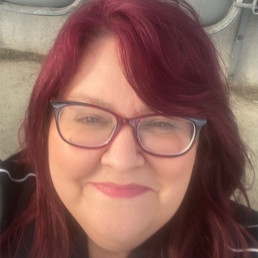
Written by Dr Teresa Crew
Dr Teresa Crew SFHEA is a Senior Lecturer in Social Policy with research interests relating to various social inequalities. More specifically Dr Crew's research explores the barriers faced by working class people in education. She is the author of the book "Higher Education and Working Class Academics: Precarity and Diversity in Academia" (Palgrave Macmillan, 2020) which examined the experiences of working class academics. Her second book, “The Intersections of a Working Class Academic Identity. A Class Apart”, will be published by Emerald in July 2024.
The echo of footsteps resonating through university hallways often carries with it a narrative of unearned advantage. This is in stark contrast to the uphill climb some have faced just to set foot on these grounds. For many working class academics (WCAs) like myself, each step reflects complex feelings of taking pride in rising above class constraints combined with a persistent sense of unease that we do not fully belong within these elite spaces. Far from being unique, this reveals that despite loud diversity rhetoric, quiet biases continue obstructing the WCA experience.
My extensive research incorporating over 250 interviews and surveys WCAs across the UK over the past 5 years reveals systemic barriers continue to make academia an inhospitable environment for many scholars from disadvantaged backgrounds. Nearly 75% faced ingrained classism subtly woven through campus culture via small slights eroding confidence in belonging. These obstacles are likely deterring talented potential working class scholars from pursuing academic careers.
Classist microaggressions served as the ever present undercurrent with manifestations ranging from derogatory comments questioning their credentials and mocking regional accents. Women endured layered inequities – both gender and class biases. Unpaid service tasks consumed valuable time otherwise dedicated to scholarly writing necessary for advancement, reflecting embedded biases limiting their mobility. Ethnic minority WCAs encountered underrepresentation and racialised stereotypes that questioned their intellectual capacity, coupled with the assumption that their presence was simply a result of diversity initiatives rather than merit.
My research also exposed profound institutional fractures at the intersection of class and disability. Participants recounted struggles to obtain reasonable adjustments. This disregard for individual needs was particularly harmful for those reliant on precarious incomes, as the absence of family wealth amplifies their vulnerability.
Our lived experiences offer a crucial counterpoint highlighting how WCAs display remarkable resilience, strong “aspirational capital” and determination. WCAs typically serve as mentors, role models, and support systems for many marginalised students. We offer innovative teaching methods and curricular interventions aimed at uplifting excluded voices and dismantling entrenched hierarchies. These interventions, informed by lived experiences at the margins, adds unique depth and insight to WCA scholarship, making us invaluable assets that enrich the tapestry of academic discourse.
Despite our remarkable resilience and talent, WCAs often find their potential curtailed rather than nurtured. Hiring discrimination, promotion bias, and precarious employment create significant hurdles, constructing invisible yet potent barriers to curtail our career advancement. Overburdened workloads and the absence of tailored support networks further exacerbate these challenges, creating a “chilly climate” within academia that often discourages many WCAs from reaching their full potential.
We must actively dismantle these barriers by challenging entrenched structures and disrupting the harmful effects of classist practices that erode individual aspirations and stifle working class potential. This demands bold, systemic change.
Key areas of action include:
- #MakeIt10. To create real equal opportunities, we must end unfair treatment based on an individual’s social class background and add social class as a protected characteristic in the Equality Act 2010
- WCAs need stable employment with living wages, enforceable rights, and consistent hours.
- Targeted career development programmes and mentoring specifically for WCAs.
These strategic interventions, informed by the powerful narratives of WCAs navigating the system, hold the key to unlocking the transformative potential of an inclusive academia. Only then can we ensure that knowledge and empowerment reach all corners of society, shaping a future where the collective brilliance of diverse minds, regardless of background, can truly flourish.
Open doors, Unequivocal mirrors, Pellucid windows
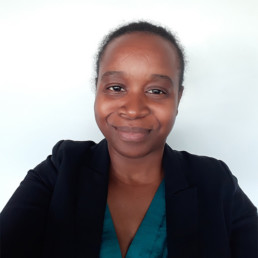
Written by Utha Vallade
Monday to Friday, Utha is an Associate Assistant Principal, leading on Raising Standards, Assessment and Reporting in an inner London secondary school. On Saturdays, she works as the co-headteacher of an all-through Saturday supplementary school. Passionate about supporting other educators on their leadership journey, in her not so spare time, Utha contributes to Step Up Network and leads on Partnerships, Diversity, Equality. Inclusion and Belonging.
As a dedicated senior leader working in a comprehensive, inner London secondary school, my journey in leadership has been defined by a commitment to continuous personal growth and professional development. Recently, I had the unique opportunity to shadow a headteacher working in a different school setting. My objective was to immerse myself in the daily responsibilities and challenges of leading a school and this experience offered me invaluable insights into the complexities and rewards of headship.
From the outset, I was fully welcomed into the smaller, rural school. The warmth and hospitality extended to me were a testament to the nurturing culture fostered by the headteacher. Throughout the week, I eagerly absorbed every leadership lesson and insight, recognising that the school’s environment and culture mirrored its authentic leadership.
What struck me most was the genuine care and respect evident in every interaction between teachers and students. Empowerment permeated the atmosphere, with students demonstrating remarkable personal growth and development under the guidance of supportive educators. Similarly, teachers and middle leaders flourished rapidly in their respective areas of responsibility and beyond. Witnessing these examples of student empowerment and staff development reaffirmed my belief in the transformative power of effective school leadership.
A key takeaway from this experience was the importance of being unapologetically caring and ambitious for all members of the school community. Every interaction, whether with students or staff, should be guided by a genuine desire to support and uplift others in the pursuit of academic outcomes and personal growth. The school I shadowed exemplified this ethos effortlessly, with caring and respecting others ingrained in its culture.
What impressed me the most was that this culture of care and respect was internalised by the school community. It was evident in the way students looked out for one another and how staff went above and beyond to support their students’ growth and well-being.
Moreover, the involvement of parents in the school’s daily life was inspiring. I saw examples of parents coming together to rebuild a fence to allow the play area around the pond to meet health and safety criteria. Another parent spearheaded a world-wide courageous advocacy programme which led students to bring conflict resolution and economic solutions to the local and wider school community. Whether rebuilding a fence or spearheading global advocacy programs, parents undoubtedly played a vital role in enhancing the school community. As an aspiring headteacher, I relish the opportunity to create an environment where everyone can flourish and thrive and for the students under my care to have a positive impact on our local and wider community. Therefore, witnessing these examples reinforced my commitment to foster positive impact in my school.
While the school environment was incredibly welcoming and nurturing, it was not without its challenges: uniform infringements, behaviour referrals and parental disagreements were part of daily school life which I have also observed in other educational settings. However, to me, the most striking difference was the timing of detentions and extracurricular activities. Due to its location in a rural town and its size (around 500 students), a significant number of students travelled to the school via coach. This meant that the school day revolved around the coaches’ departure times. As a result, detentions and clubs, including rehearsals for the school production or student-led assemblies had to run at lunch time rather than after school like in most London schools. All these challenges simply reminded me that the role of a headteacher carries immense responsibility and requires equally immense resilience and tremendous adaptability to the specific context of the school.
In conclusion, my week shadowing a headteacher was an insightful experience that reaffirmed my commitment to headship. It underscored the profound impact a caring and ambitious leader can have on a school community. As I continue my leadership journey, I will apply the lessons learned and strive to continue to make a meaningful difference in the lives of students and teachers alike.

